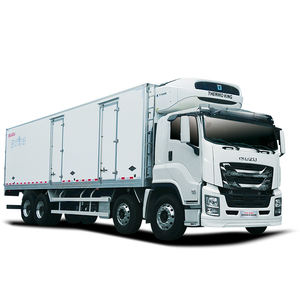Advanced Thermo King Truck Refrigeration Units for Dependable Delivery
Advanced Thermo King Truck Refrigeration Units for Dependable Delivery
Blog Article
Choosing the Right Transport Refrigeration System for Your Fleet
Selecting an appropriate transport refrigeration system for your fleet is a vital decision that can considerably impact operational effectiveness and product stability. It necessitates a thorough understanding of your specific refrigeration demands, consisting of temperature needs and delivery timetables.
Recognizing Your Refrigeration Demands
When picking a transportation refrigeration system, recognizing your details refrigeration requirements is critical to making sure item quality and compliance with market criteria. Various factors must be thought about to figure out one of the most suitable system for your procedure. These consist of the kind of items being moved, their temperature demands, and the duration of transportation.
For disposable items, such as fresh fruit and vegetables or drugs, exact temperature level control is important. Comprehending the temperature level range needed for every product allows for the selection of a system that can preserve those conditions regularly. Additionally, consider the regularity of distributions and the range took a trip; longer journeys may require systems with enhanced insulation or back-up power alternatives to stop temperature fluctuations.

Additionally, the capability of the refrigeration unit should line up with your load size. Overwhelming a device can bring about insufficient cooling, while an extra-large system might be pricey and inefficient. Governing compliance is necessary; familiarize yourself with regional and international guidelines governing the transportation of temperature-sensitive products. By thoroughly assessing these variables, you can make certain that your chosen transportation refrigeration system efficiently satisfies your functional requirements and maintains item integrity.
Sorts Of Transport Refrigeration Systems
Selecting the right kind of transportation refrigeration system is critical for ensuring the secure transit of temperature-sensitive products. There are a number of systems offered, each designed to fulfill certain needs and applications.
These systems are often preferred for their efficiency and lower initial expenses. An additional option is the central refrigeration system, which serves several compartments or cars from a single compressor unit.
Furthermore, there are self-contained refrigeration devices that combine the compressor and evaporator in one bundle. When room is restricted, these systems are suitable for smaller sized cars or. For specialized applications, such as delivering perishables or pharmaceuticals, cryogenic refrigeration systems may be made use of, utilizing fluid nitrogen or carbon dioxide to keep ultra-low temperatures.
Lastly, hybrid refrigeration systems that combine diesel and electric power are ending up being significantly popular, using flexibility in power usage and decreasing ecological influence. Comprehending these various kinds enables fleet drivers to make educated choices customized to their particular functional needs.
Trick Functions to Take Into Consideration
Exactly how can one ensure that a transport refrigeration system fulfills all functional needs? To attain this, several vital features must be carefully evaluated. Firstly, temperature control is critical; systems ought to provide accurate temperature level settings to fit numerous products, varying from frozen items to disposable items.
Power efficiency is one more important consideration, as it impacts operational expenses. Search for systems that utilize sophisticated modern technology, such as variable speed compressors, to enhance energy usage without endangering efficiency.
Another feature to analyze is the dependability and sturdiness of the equipment. Systems created from top quality materials and developed for durability against extreme problems will certainly lower upkeep expenses and downtime.
Moreover, the convenience of maintenance and availability of elements can significantly affect operational performance (refrigerated transportation thermo king). Functions like modular styles or remote surveillance capacities can streamline service procedures
Finally, compatibility with existing fleet management software program can enhance tracking and reporting procedures. By focusing on these key features, fleet operators can ensure that their transportation refrigeration systems not look at here just satisfy current needs but also adapt to future demands.

Budgeting for Refrigeration Solutions
Evaluating essential features of transport refrigeration systems is just one component of ensuring operational performance; budgeting for refrigeration services is just as essential. A well-structured spending plan not only incorporates the preliminary acquisition rate yet also takes into consideration long-term operational expenses, including energy consumption, maintenance, and possible fixing demands.
When establishing a budget plan, fleet supervisors ought to first evaluate the overall cost of ownership (TCO) This includes not only the procurement costs but likewise continuous expenditures associated with fuel efficiency and the sturdiness of the refrigeration devices. Selecting systems with higher power effectiveness rankings might generate substantial savings gradually, mitigating ahead of time prices.
Furthermore, fleet operators ought to account for prospective scalability. As companies grow, the refrigeration needs may change, demanding upgrades or extra units. Planning for these future costs can protect against economic stress.
Financing options can likewise play an essential role in budgeting. Leasing, lendings, or outright purchases each have distinct economic effects, and understanding these can assist in making an educated choice. Inevitably, an extensive spending plan that considers both prompt and future needs guarantees that transport refrigeration systems contribute favorably to the overall operational performance of the fleet.
Upkeep and Assistance Alternatives
In the world of transportation refrigeration systems, efficient maintenance and support choices are crucial for ensuring optimal efficiency and durability. Routine maintenance is necessary site link to protect against malfunctions and preserve the integrity of temperature-sensitive cargo. It is recommended to establish a routine examination timetable with certified specialists who can do necessary checks and repair services on refrigeration devices.
Assistance options need to consist of a durable service agreement, covering both routine upkeep and emergency situation fixings. This ensures that your fleet has access to trigger support, lessening downtime and keeping operational effectiveness. Several suppliers use thorough assistance packages that consist of training for your personnel, allowing them to do standard troubleshooting and maintenance jobs.
Additionally, making use of remote monitoring innovation can improve your maintenance strategy - refrigerated transportation thermo king. These systems supply real-time data on temperature and performance, enabling aggressive actions before concerns rise. Buying training and innovation not just boosts your look at this now fleet's dependability but also prolongs the lifespan of your refrigeration systems
Inevitably, a critical method to upkeep and support will certainly secure your financial investment and ensure that your transport refrigeration systems run at peak efficiency, providing regular results for your company.

Conclusion
In conclusion, picking the ideal transport refrigeration system for a fleet requires a comprehensive evaluation of certain refrigeration needs, system kinds, and crucial features. Furthermore, careful budgeting and preparation for future scalability will add to the lasting success of the refrigeration approach.
Selecting an ideal transport refrigeration system for your fleet is a critical decision that can substantially affect operational performance and item stability.When picking a transportation refrigeration system, recognizing your certain refrigeration demands is critical to making certain item quality and compliance with market criteria. By extensively assessing these factors, you can ensure that your chosen transport refrigeration system successfully fulfills your functional needs and keeps item integrity.
Ultimately, a detailed spending plan that takes into consideration both immediate and future requirements guarantees that transportation refrigeration systems add favorably to the overall operational performance of the fleet.
In verdict, choosing the ideal transportation refrigeration system for a fleet requires a comprehensive analysis of details refrigeration demands, system kinds, and essential features.
Report this page